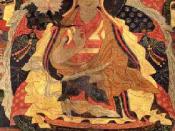Catholicism and the Buddhist faith are two of the world's most popular religions. This essay aims to explain how morality is interpreted by both Catholicism and Buddhism through the spiritual leaders of both.
In order to show immediately that these two religions differ greatly, here are some key points. First, the ultimate goal of Buddhism is to escape samsara, the cycle of rebirth, the ultimate goal of Catholicism is to join God in heaven. "In fact, body and soul are inseparable: in the person, in the willing agent and in the deliberate act, they stand and fall together. (Pope 49)" This says nothing of morality, but it is a contradiction. Next, consequential view vs. teleological view: In Buddhism, actions are viewed as either good or bad based on their consequences. According to Catholicism, mortal sins are intrinsically evil no matter what the circumstance. There are countless other differences between the two spiritual leaders' perceptions.
This essay is more directed towards morality in the two religions.
Buddhism states that the innate human capacity to empathize with others is all that is truly certain, it renounces religion as unnecessary but it also says that people find it helpful in their quest for happiness. Catholicism states that God's law is natural, and through the revealed law of the church and through man's reason that one can achieve union with God. So both religions say that their way to find happiness is through morality in an indirect fashion. Empathy leads one to happiness down a winding road that requires one to follow in order to achieve nirvana. This is only possible through the understanding of the necessity of love and compassion (Dalai Lama 234).
Catholic beliefs state that true freedom is found through and in the service of God, conversely Buddhism posits that happiness...


